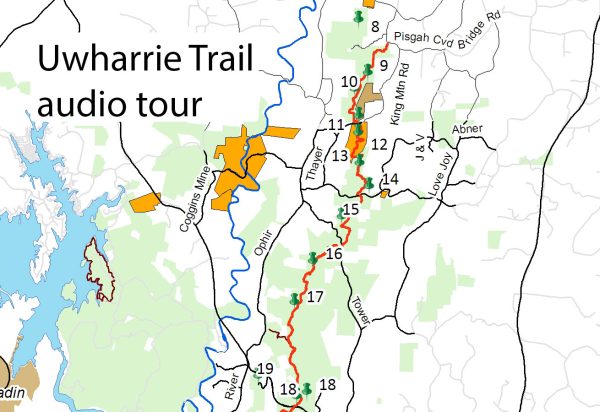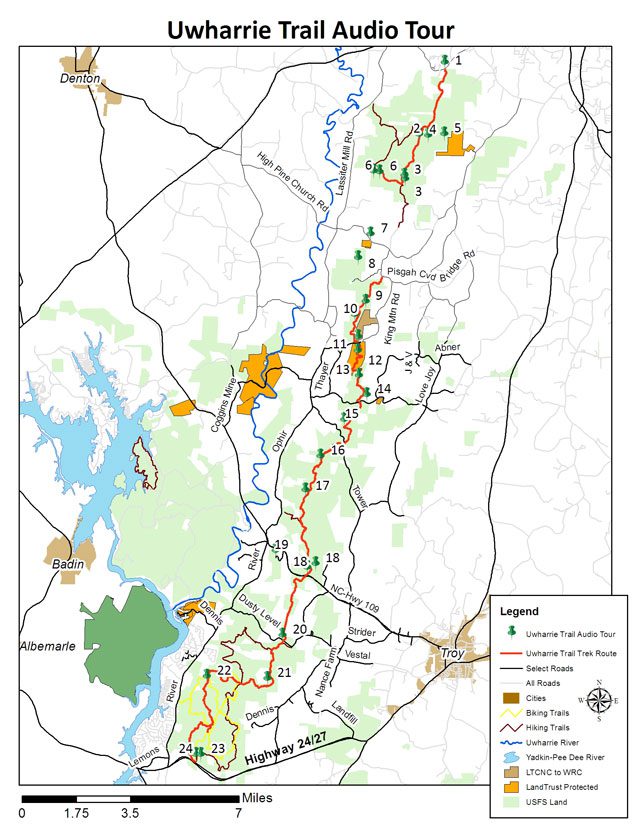Listen to a guided tour of the Uwharrie Trail

As you hike along the Uwharrie Trail, you may come upon a newly installed Uwharrie Trail audio tour marker and wonder what it is. If you have cell service, you can click on the QR code shown and hear a short story about the historic, natural or cultural significance of the very spot to which you have hiked in the wilderness.
This unusual audio tour experience has been made possible thanks to the work of Life Scout Chris Moncrief, Land Trust for Central North Carolina intern Rebecca Schoonover, trail founder Joe Moffitt, and many other Uwharrie Trail and LandTrust partners and friends.
|
Getting there Trailhead parking for the Uwharrie Trail is on N.C. 24/27, 10 miles west of Troy. Click here for more information. |
The Uwharrie Trail audio tour project builds on work by land trust staff and interns to identify locations and sites of interest on the trail. The tour consists of short stories of the natural, historical, or cultural significance of the sites highlighted. The land trust settled on 24 points of interest along the trail, and Chris Moncrief and his team spent several long days installing markers at those points of interest over tough terrain. “We had no idea how mountainous this area was when we started this project,” Moncrief told LandTrust staff. “It was a very challenging and rewarding experience.”
He recorded the stories in an audio format and uploaded them to a website so those with cell phone service can hear the stories before or during a hike. Moncrief spent more than 25 hours just recording the audio tours.
Audio files are available at http://landtrustcnc.org/ut-audio-tour/. Hikers will also be able to download the stories as a podcast, before starting a hike. That lets them hear the stories as they reach the designated sites even if they can’t pick up mobile phone service (which can prove a challenge in the remote Uwharrie wilderness). You can hear the stories now at this website: http://grooveshark.com/#!/album/Uwharrie+Trail+Audio+Tour/9813897
The project’s goal was to document some of the stories and folklore of the Uwharries, using the Uwharrie Trail as the thread to weave the stories together. The stories celebrate a shared natural and cultural heritage special to many people in the region, and they provide visitors with a sense of place. The Uwharrie Trail was created in the 1970s and historically was 53 miles long, going through some public national forest land and some private land. The trail founder, Joe Moffitt, secured handshake agreements to create and keep the trail open. However, as time passed, parcels were sold, or people moved away, and the trail was limited to the 20 miles on U.S. Forest Service land. Conservation partners have filled three of four gaps in the trail by acquiring land, and this audio trail also documents those conservation success stories.
The Uwharries are a biodiverse place with natural significance, rare communities and species. The importance of preserving the trail for historical and natural significance cannot be overstated. The Piedmont is often overlooked as a recreational and natural diversity tourism destination, but the Uwharrie area is among the most ecologically significant regions in North Carolina, and is being used increasingly for recreational purposes as “North Carolina’s Central Park.” It is within a 90-minute drive from 5 million people living in the Charlotte, Triad and Triangle urban regions. Preserving this long expanse of trail gives people a wild place to get away and immerse themselves in natural settings, which can raise the quality of life and build an appreciation of land and the need to preserve it.
The Uwharrie Tail audio tour will educate visitors and locals about the Uwharries’ cultural and biological heritage, as well as inspire them to get involved with the efforts to reconnect the trail to its full length.
Trail users can now hear the stories of unique glade communities, old fire towers, the ghosts of settlers’ past, and many other tales that make this landscape and community so special.
